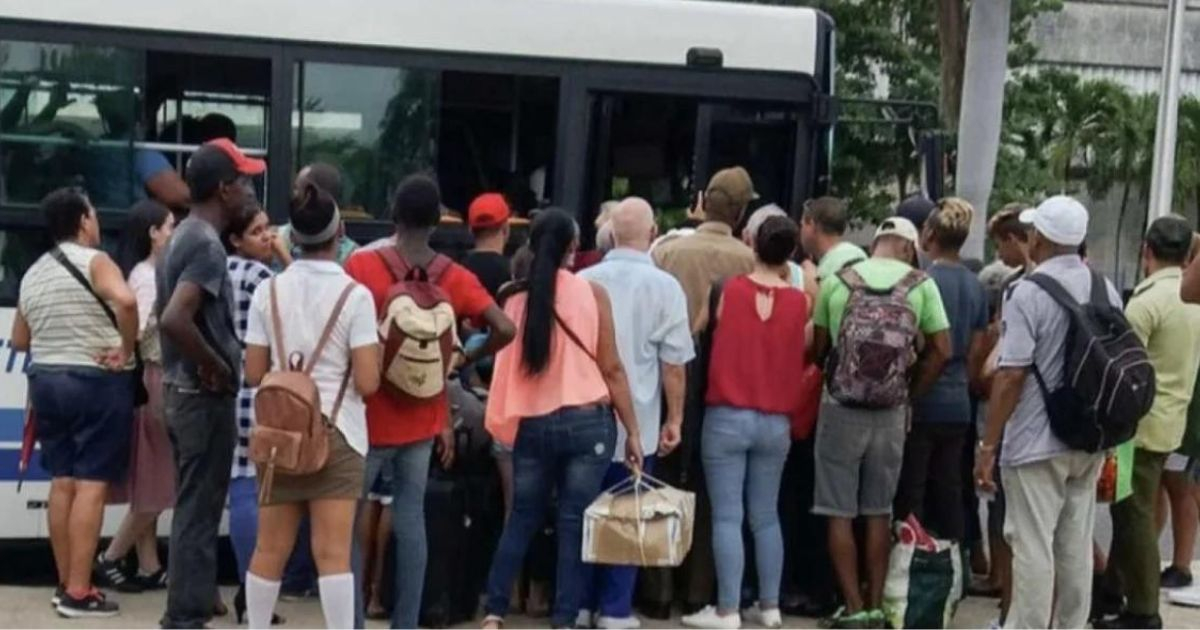
The crisis in public transportation in Santiago de Cuba, evident from the large crowds at bus stops at any time of day, forced the local government to take a desperate measure: to compel drivers from state-run companies to transport the population during peak demand times.
Noralquis Guerra Guevara, director of the Business Unit for Terminals and Alternative Means in Santiago de Cuba, reported that there are 110 local units participating in "solidarity transportation" with their vehicles, as reported by the official newspaper Sierra Maestra.
However, the directive warned that out of all the entities that could help alleviate the crisis with their vehicles, “3% have not participated in this activity due to a lack of available vehicles,” which is another undeniable indication of the precarious state of transportation in the province.
In addition, he reported that not all drivers participate in "solidarity transportation," pointing out that some do not stop at the pick-up points.
He pointed out that the companies involved make their vehicles available during the hours of 6:30 AM to 8:30 AM and in the afternoon from 4:00 PM to 5:30 PM, which coincide with the times when the transport crisis in Santiago de Cuba is most evident.
Although the management advocated for "solidarity transportation" to be carried out in a "conscious" manner, it threatened drivers with the placement of inspectors at the locations with the highest concentration of people.
According to the official newspaper, at each “solidarity transport” point, there must be a “team” responsible for “organizing and controlling.”
Rogelio Samada Rubio, deputy provincial director of transportation in Santiago de Cuba, urged the discussion of the topic of “solidarity transportation” in the morning meetings of state entities. According to him, this is the way to ensure that drivers cooperate consciously.
Due to the regime's inability to resolve the transportation crisis in Santiago de Cuba, the official admitted that they have had to resort to using rented buses.
Samada acknowledged that the lack of fuel exacerbates mobility problems, noting that some vehicles, even if they are operational, cannot take to the streets due to the shortage of fuel.
The official recalled that resolution 435 from 2002, issued by the Ministry of Transportation, states that state vehicles are required to assist with transportation during their return trips.
Despite the existence of this legal instrument and the mobilization of officials and inspectors at the "solidarity transportation" points, Samada acknowledged that there are still drivers on the streets operating without any passengers, illustrating the regime's inefficient management.
"In light of the non-compliance, a daily analysis and a weekly summary are conducted with the vice governor regarding all drivers who negatively impact the situation, and measures are implemented that may include the permanent removal of any driver who repeatedly fails to comply," he emphasized.
However, the transportation issue is prevalent in all the cities across the country.
In Cuba, public transportation mobility is critical, and one only needs to look at the numbers of buses currently operating in the capital to see this: 252 vehicles according to official figures, a number that is lower than the amount of buses that remain out of service: 309.
In Cuba, public transportation is crucial for mobility. This is evident from the current numbers of buses operating in the capital, with only 252 vehicles in service, according to official figures, which is lower than the 309 buses that are not in operation.
This was reported last March during a recap by the Ministry of Transport (Mitrans), where Yunier de la Rosa Hernández, the general director of Transport in Havana, described the situation in that area as "complex."
In May, Cuba's Minister of Transport, Eduardo Rodríguez Dávila, acknowledged the poor service provided by the government to those who need to travel to the Isle of Youth.
In a post shared on his Facebook profile, Rodríguez Dávila acknowledged that the process is extremely uncomfortable and cumbersome, from purchasing the ticket to arrival.
Filed under: